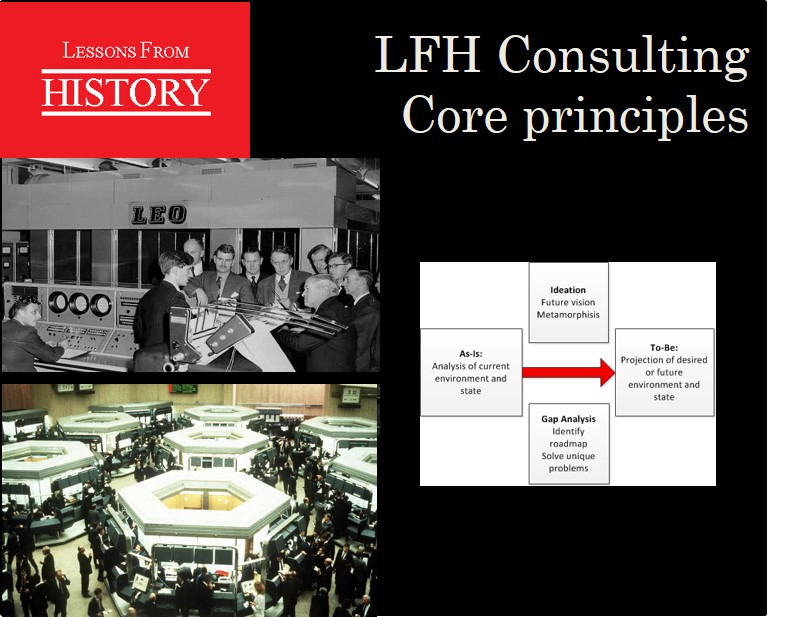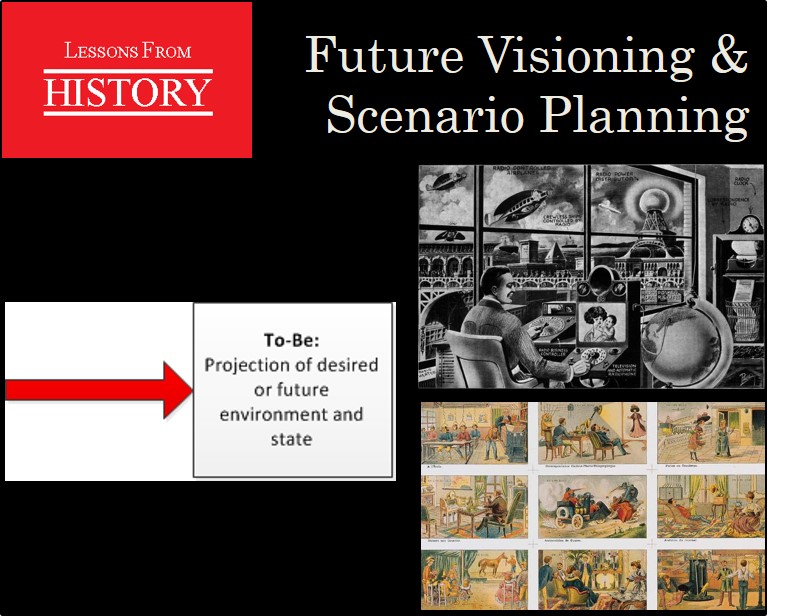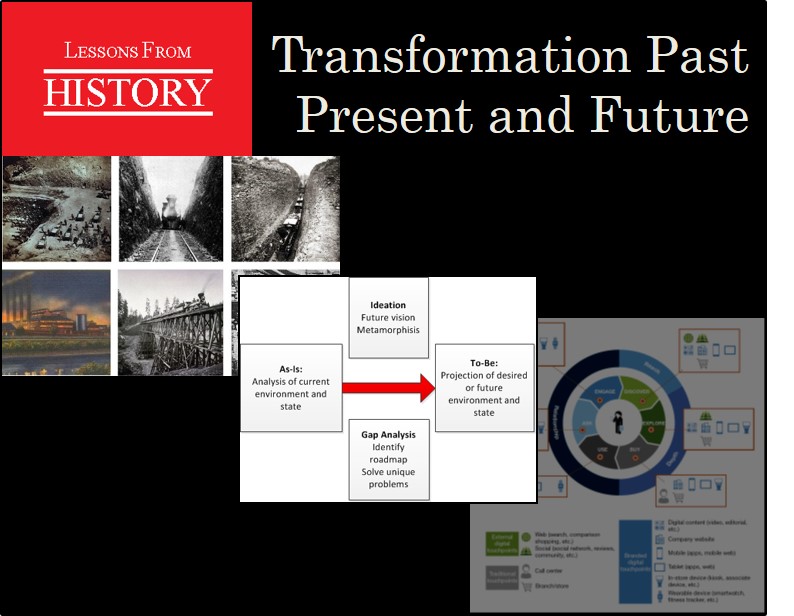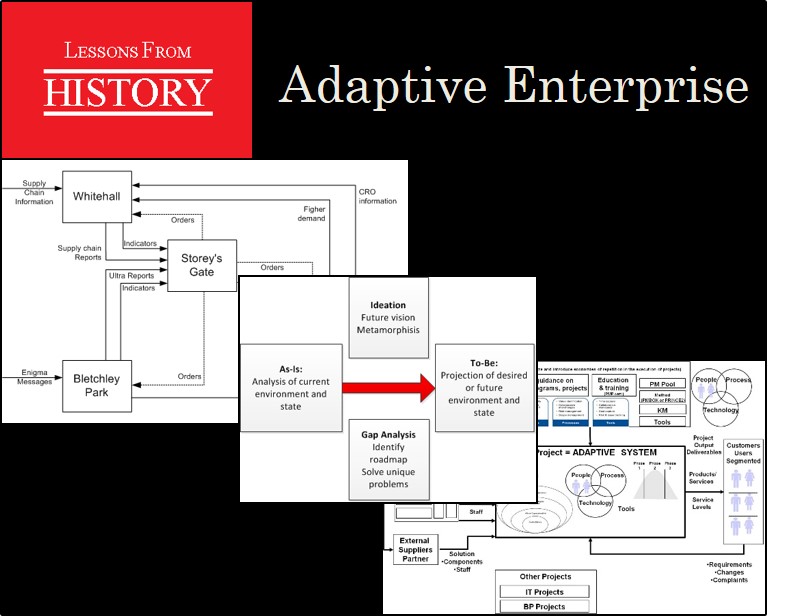LFH Overview
LFH Consulting Services
Why LFH Consulting?
 Core principles of LFH and using history as a baseline for consulting. Read more
Core principles of LFH and using history as a baseline for consulting. Read moreFuture Visioning
 Visioning and planning for the future of the business world. Read more
Visioning and planning for the future of the business world. Read moreTransformation
 Creating a resilient transformation strategy based on historical lessons.Read more
Creating a resilient transformation strategy based on historical lessons.Read moreAdaptive Enterprise
 Establishing a sense and respond organization adaptable to change. Read more
Establishing a sense and respond organization adaptable to change. Read more
Core principles and using history as a baselineLFH has designed a unique series of consulting services that help organizations go through transitions and transformations by finding innovative solutions and shaping initiatives by drawing on historical paradigms and scenarios, and combining these with contemporary practices, lessons, and solutions. For example, organizations that are looking to move to a digital business or enterprise. LFH works with the organization, its affiliates and partners to help enable this. Each LFH consulting service is unique because it uses historical research and a case-study repository, of transition periods of the past, to select transformative projects that had some similar characteristics and may carry important lessons. These broad and diverse projects can provide fresh insight into how problems were solved and were delivered, and these transformations were made. They describe the complexity, actuality and contextualization which are all important considerations and provide an insight into the scope, risk, politics, human factors and impact of the transformation projects. In summary, LFH has the ability to translate these historical case-study into valuable attributes that business leaders can use in their organizations. Compass Directional ConsultingLFH services are underpinned by Compass Directional Consulting. This consulting approach was based on exploring in a facilitated working session, the as-is and to-be. The approach was evolved in the 80s and is the template to today's consulting approaches. We have taken this further by incorporating past states and transformations from these to the present. We complete qualitative research on developing compatible historical case studies, and extrapolating lessons learned. This is combined with contemporary ideas to create new knowledge and adapt existing methods. |
|
Visioning and planning for the future of the Business WorldOne cannot know the future, but by examining the past one can get some idea of whether one is watching a mountain stream or a glacier. Anon. LFH provides services that assist organizations provide future visioning and scenario planning in advance of creating a transformation strategy. We draw on a range of historical case studies that involved a future vision and focus for the protagonists. These highlight how markers were set for the transition and transformation outcomes. By taking input from the past, through historical case studies, and combining it with the present we can start to better visualize the future that goes beyond the anticipation of the future effects of current actions. History can legitimize or delegitimize possible strategic routes for the future. We ask questions like have the organization’s future strategic choices been shaped by "path dependence", the path the organization has metaphorically traveled over time? Is path creation an option, a way to shape the current states and create novelty? To understand the future we need to look at the past. The future is just the past with extra bits attached (James Burke, 2013) |
|
Transformation Projects - Past Present and FutureLFH can help an organization on its transition journey from the present to the future but with an understanding of the past. What differs LFH from other approaches is we draw on historical case studies of a modern day equivalent of transformation project, and we pay very close attention to the lessons of the past. We use these historical lessons to better understand the scope of the transformation and changes, how these were managed, and the impact of the transformation externally to the organization and internally to its culture and its business/operating models. With this understanding we can help an organization create its (iterative) transformation strategy based on its history and culture that includes not just technology but the people (organization), and processes (like decision making). We use historical baselines to highlight potential resistance, or whether the strategy is the right one to take. We also use these baselines to help leadership create a shared vision with a business case and put the formal governance in place to run a successful transformation. We highlight how progress can be tracked and measured so that the speed of execution and pace can be maintained. |
|
Establishing a sense and respond organization adaptable to changeLFH provides services that assist organizations in becoming more adaptive. An adaptive enterprise is an organization in which the goods or services demand and supply are matched and synchronized at all times. Such an organization optimizes the use of its resources, always using only those it needs and paying only for what it uses, yet ensuring that the supply is adequate to meet demand. An adaptive enterprise modifies the way an organization behaves, namely in how it wrestles with change. It rapidly reacts to business events in real-time, compares them against various scenarios, and enacts appropriate countermeasures to stay ahead of its competition and thrive. Large organizations can become more agile and mimic the characteristics of a small organization through recent advances in emerging technologies. For example, the Internet of Things, enterprise social networks, mobile systems, big data analytics, and cloud services, which can support smart connected products and services in a digital transformation. We draw on a historical case studies of a modern day equivalent of an adaptive enterprise namely, one that was created in May 1940 using the emerging technologies of the day so that it could adapt to an unexpected situation. It provides an example of an organization that is more resilient to rapid and unpredictable change, a 21st Century issue, and a goal that many leaders aspire to today for their organizations. |
|

